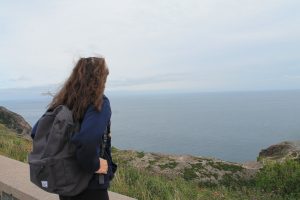As humans, almost all of us face fearful situations in our life where we must chose whether to flee, fight, or out-smart. But many of us will not be facing these situations in the midst of the biggest world war in history, where every move you make is either left or right, safe or not, live or die. Not like Helmut Lemke did.
About a month ago, as a class, we had the amazing opportunity and privileged to have WW2 veteran Helmut Lemke come and discuss his life story and experiences in the war with us.
One of the most intriguing things to discuss with him was the fact that he was not a Canadian soldier, but in fact a German soldier, who fought on the Russian front. His perspective on fighting and his journeys that he overcame, were captivating to listen to and reflect on.
I was able to take so much away from his talk, including a deeper understanding of the diversity of war and how it must have felt to have had to survive in a place where fear is the all powerful emotion. These thoughts then lead me to develop my question, which was; “How does the mind and body adapt in the face of difficult or dangerous situations?” I wanted to figure out why our minds take in a situation and either react badly and freeze up, or react quickly and creatively, all in order for ourselves to survive.
Helmut was seven years old when Hitler came to power, and thirteen when WWII started. At the end of his Grade 10 year, he was drafted and transferred to army barracks along with his class. And finally, at the age of 18, Helmut was drafted into the army and sent to the Russian Front for Germany. During his time in the SS, he experienced horrors that only men in a terrifying war could experience. He told us of times where he escaped death by the skin of his teeth, using his quick thinking skills, and random creativity. I was baffled at how many times he repeated that it all could have easily gone wrong, but it didn’t. His story was a perfect example of how the human body and mind react in life or death situations.
So, as part of this assignment, I worked with Anatolia and Brianna to create a podcast, where we discussed the concept of creativity in the face of danger, and how fear plays a part in decision making of soldiers, particularly in the setting of WW2 and Helmut’s story.
Enjoy…



















